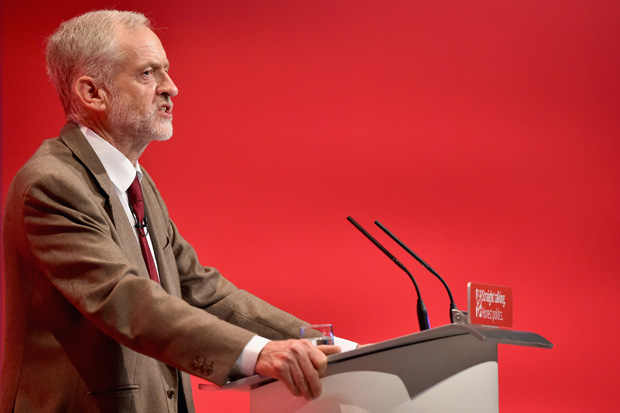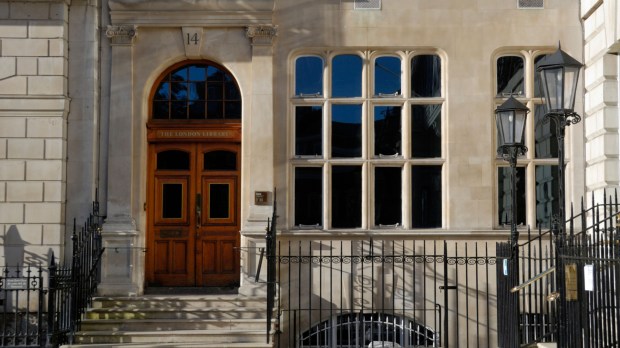Contrary to the sneers of what he calls the commentariat, Jeremy Corbyn has already acquired brilliant spin doctors. In advance, the media was full of how his party conference speech would be all about his patriotism. Actually, this was barely mentioned. This technique of spinning the speech beforehand is pure Mandelson/Campbell. The emphasis on ‘free debate’ is also spin. In fact, the subtext of the speech was what communists call ‘the leading role of the party’ — control by activists. It was cunningly done, apparently sweet, actually tough.
Mr Corbyn also followed the proud tradition of the Bush family. He accidentally read out the instruction, ‘Strong message here.’ President Bush Snr, making a similar mistake, once declaimed: ‘Message is: I care.’
Radio 3 on Saturday had interesting, if over-long programmes about the effect of music on the mind. In one of them, people were discussing musical education. All the panellists agreed with the proposition that ‘everyone is musical’. Later in the day, I attended an exhibition opening at the De La Warr Pavilion, Bexhill, at which Peter Bazalgette, the chairman of the Arts Council, spoke. ‘Everyone is an artist,’ he said. Two things struck me about these propositions. The first is that they are now the orthodoxy in the arts: no teacher in the state system or anyone working in the subsidised arts could publicly deny them and expect to get promotion. The second is that they are not quite true. Some people are extremely unmusical and/or unartistic, just as some are bad at sport, mathematics or acting. If people refuse to accept this, they will waste a lot of time. They will also tend to deprecate high art/music, and high individual achievement in art/music, on the grounds that art/music is what everyone can do. Quality gets equated with ‘elitism’, from which it is not much of a step to filling the National Gallery with kiddy pictures.
What is true, however, is that almost everyone can benefit from art and music. Almost everyone can learn some techniques — drawing, piano — to some extent. Just as even very unpromising pupils can usually learn to read and write, so they can learn to draw a recognisable picture of a cow or play a simple tune. In doing so, they will learn something to their advantage as appreciative and expressive human beings. More interesting, from the point of view of everyone else, some without formal qualification may produce something that makes us think or feel. The show Peter Bazalgette was opening was a case in point. Called ‘In the Realm of Others’, it was produced by the brilliant Project Art Works, which helps people with severe neurological impairments. I was there because two of my nephews, George and Sam Smith, both autistic, were participants. It was fascinating to see how each exhibitor has a distinct character as an artist, as in life. Accompanying videos showed the authors at work. Sam attacked the canvas boldly and sometimes noisily, squirting the paint out of tubes to produce striking effects not unlike those of Gerhard Richter. George, the more verbal and outwardly sensitive of the two, was more delicate and his work more etiolated. With theirs and most of the other works in the show, one could see neuro-untypical minds producing challenging perceptions which differ from those of ‘normal’ people.
The De La Warr Pavilion features as ‘a badly maintained modernist building’ in David Hare’s recently published memoir The Blue Touch Paper. (It is well looked-after today, I am glad to say.) Hare was born in St Leonards in 1947 and moved to nearby Bexhill when he was five. I was born in next-door Hastings in 1956 and brought up in the country nearby. As a child, I visited Bexhill, chiefly to go to the dentist. So I am interested by his view of the place. ‘For any young person,’ Hare says, ‘“Bexhill” and “boredom” were joined at the hip.’ It was not so for at least one young person. I loved the elegance of the De La Warr, surreal beside the surging sea and the pseudo-Indian buildings on the front. It seemed a realm of the imagination. Hare vividly evokes the feeling of being trapped in a culture obsessed, after the war, with quiet respectability, so repressed that ‘lifestyle could kill’. He longed to escape. I remember almost exactly the opposite sense — an attraction to a place where nothing much happened in the street and a corresponding, unsatisfiable interest in the lives lived behind net curtains and privet hedges. This was not my way of life (I was brought up on a farm) but I instinctively respected it. It is interesting how one’s political views are formed by the pre-political feelings of childhood. It is wholly fitting that David is a great left-wing playwright and I a jobbing member of Jeremy Corbyn’s detested commentariat.
I am grateful for the letter from Professor Geoff Palmer (Letters, 26 September) about the interview which he believes he had in 1964 in which Sir Keith Joseph allegedly told him to go home and grow bananas. (I did not say that the interview took place at Nottingham University, but that Sir Geoff sought a place there, so I cannot offer the apology which he requests.) In further inquiries, I have found no evidence that Sir Keith had anything to do with the Ministry of Agriculture which — according to Sir Geoff in the BBC programme where he told the story — he represented on the interview panel. A friend who worked with Joseph during the 1979 election campaign remembers him specifically telling him that he would answer any question on any subject except agriculture, since he knew nothing about it. Besides, it would have been against the rules for a cabinet minister to take part in choosing an individual student to receive a government grant. The racism charge against Keith Joseph is serious, so it is worth establishing whether it is correct. Can Sir Geoff help elucidate?
Got something to add? Join the discussion and comment below.
Get 10 issues for just $10
Subscribe to The Spectator Australia today for the next 10 magazine issues, plus full online access, for just $10.
You might disagree with half of it, but you’ll enjoy reading all of it. Try your first month for free, then just $2 a week for the remainder of your first year.















Comments
Don't miss out
Join the conversation with other Spectator Australia readers. Subscribe to leave a comment.
SUBSCRIBEAlready a subscriber? Log in